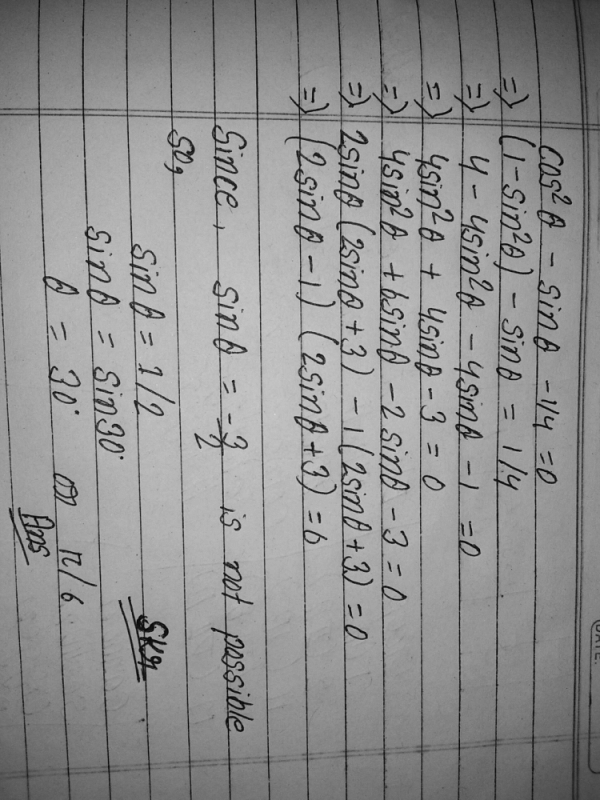Class 11 Exam > Class 11 Questions > Cos^2 theta - sin theta - 1/4=0?
Start Learning for Free
Cos^2 theta - sin theta - 1/4=0?
Community Answer
Cos^2 theta - sin theta - 1/4=0?
Solution:
Step 1:
We can write cos²θ as (1-sin²θ), so the equation becomes:
(1-sin²θ)-sinθ-1/4=0
Step 2:
We can simplify the equation further by multiplying both sides by 4 to get rid of the fraction:
4(1-sin²θ)-4sinθ-1=0
Step 3:
We can then distribute the 4 and simplify:
4-4sin²θ-4sinθ-1=0
-4sin²θ-4sinθ+3=0
Step 4:
We can solve for sinθ by using the quadratic formula:
sinθ = (-b ±√(b²-4ac))/2a
sinθ = (-(-4) ±√((-4)²-4(-4)(3)))/2(-4)
sinθ = (4 ±√16+48)/(-8)
sinθ = (4 ±√64)/(-8)
Step 5:
We can simplify further to get:
sinθ = (-1/2) or sinθ = (-3/4)
Step 6:
Now that we have sinθ, we can solve for cosθ by using the identity:
cos²θ + sin²θ = 1
cos²θ = 1 - sin²θ
Step 7:
Plugging in sinθ = (-1/2), we get:
cos²θ = 1 - (-1/2)²
cos²θ = 3/4
cosθ = ±√3/2
Step 8:
Plugging in sinθ = (-3/4), we get:
cos²θ = 1 - (-3/4)²
cos²θ = 7/16
cosθ = ±√7/4
Step 9:
Therefore, the solutions for θ are:
θ = π/6, 11π/6, 2π/3, 4π/3
Conclusion:
The solutions to the equation cos²θ - sinθ - 1/4 = 0 are θ = π/6, 11π/6, 2π/3, 4π/3.
Attention Class 11 Students!
To make sure you are not studying endlessly, EduRev has designed Class 11 study material, with Structured Courses, Videos, & Test Series. Plus get personalized analysis, doubt solving and improvement plans to achieve a great score in Class 11.

|
Explore Courses for Class 11 exam
|

|
Similar Class 11 Doubts
Cos^2 theta - sin theta - 1/4=0?
Question Description
Cos^2 theta - sin theta - 1/4=0? for Class 11 2024 is part of Class 11 preparation. The Question and answers have been prepared according to the Class 11 exam syllabus. Information about Cos^2 theta - sin theta - 1/4=0? covers all topics & solutions for Class 11 2024 Exam. Find important definitions, questions, meanings, examples, exercises and tests below for Cos^2 theta - sin theta - 1/4=0?.
Cos^2 theta - sin theta - 1/4=0? for Class 11 2024 is part of Class 11 preparation. The Question and answers have been prepared according to the Class 11 exam syllabus. Information about Cos^2 theta - sin theta - 1/4=0? covers all topics & solutions for Class 11 2024 Exam. Find important definitions, questions, meanings, examples, exercises and tests below for Cos^2 theta - sin theta - 1/4=0?.
Solutions for Cos^2 theta - sin theta - 1/4=0? in English & in Hindi are available as part of our courses for Class 11.
Download more important topics, notes, lectures and mock test series for Class 11 Exam by signing up for free.
Here you can find the meaning of Cos^2 theta - sin theta - 1/4=0? defined & explained in the simplest way possible. Besides giving the explanation of
Cos^2 theta - sin theta - 1/4=0?, a detailed solution for Cos^2 theta - sin theta - 1/4=0? has been provided alongside types of Cos^2 theta - sin theta - 1/4=0? theory, EduRev gives you an
ample number of questions to practice Cos^2 theta - sin theta - 1/4=0? tests, examples and also practice Class 11 tests.

|
Explore Courses for Class 11 exam
|

|
Suggested Free Tests
Signup for Free!
Signup to see your scores go up within 7 days! Learn & Practice with 1000+ FREE Notes, Videos & Tests.


























